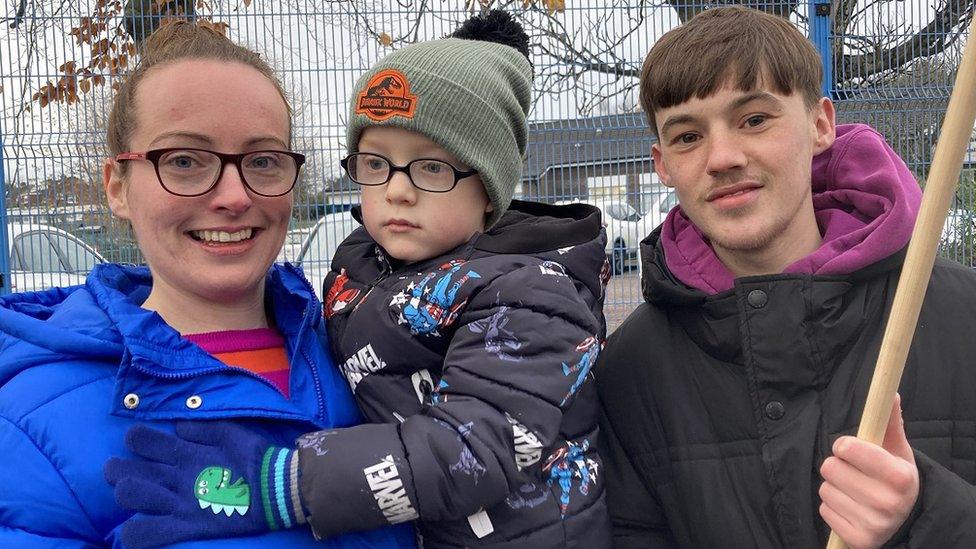EA suggests parents cover special school strike

Erin Ballantine says she's considering leaving her job
- Published
The Education Authority (EA) had suggested that parents and volunteers could stand in for striking staff at a special school in Belfast, it has been revealed.
Thousands of non-teaching staff - including bus drivers, classroom assistants and canteen staff - are striking on Monday.
Workers in the Unite, GMB and Nipsa trade unions have walked out as part of a long-running dispute over pay and job grading.
The principal of Harberton Special School, James Curran, said it is "a disgrace" that the school has had to close one of its campuses due to industrial action.
The EA said the strike action would "cause significant disruption" to special schools.
"There were circumstances where it was appropriate to utilise volunteers if it was necessary," EA's assistant director Matthew McDermott said.
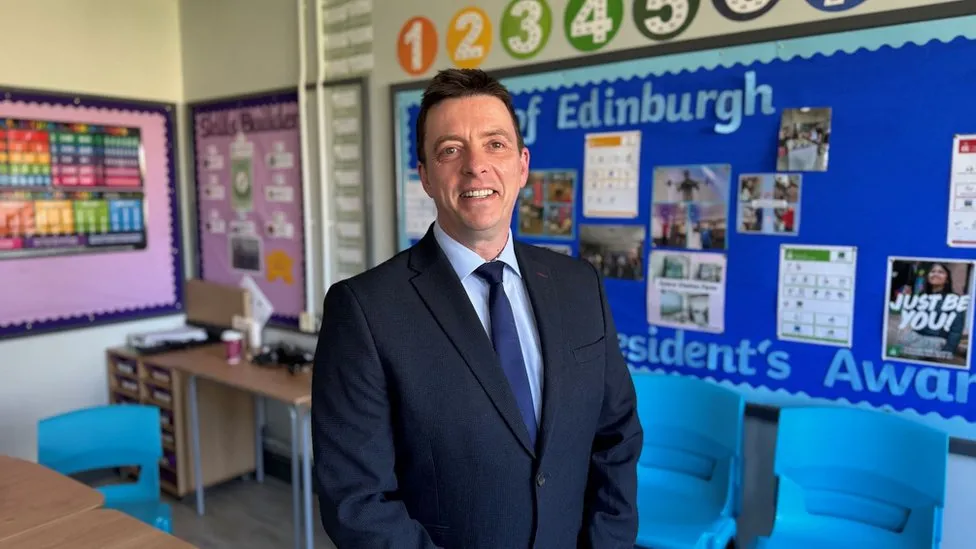
James Curran says its "a disgrace" that his school has had to partially close
Harberton, which operates from two Belfast campuses, has had to close one of its sites for the next three days as up to 30 members of staff are expected to strike.
Mr Curran told BBC News NI's Good Morning Ulster programme it was a "devastating" decision that was "taken out of his hands".
"Our decisions are based on whats right for children... The risk just becomes very difficult to mitigate against," he said.
According to Mr Curran, on Friday evening the EA had suggested Harberton use substitute teachers to cover absences, of which he said there is a "real lack".
Another suggestion was bringing parents and volunteers in to support the children.
"It would put those people at an incredible risk to bring them in to support children who they don’t know," he said.
"We would need to try and organise training at the very last minute... It really wasn’t something that we could actually deliver on."
The EA has confirmed that, for several schools, this mitigation was suggested but it is understood no school has followed through with the request.
"Our non-teaching support staff are very skilled professional staff," Mr McDermott told Good Morning Ulster.
"When they go out on strike there is no easy mitigation that we can put in place."
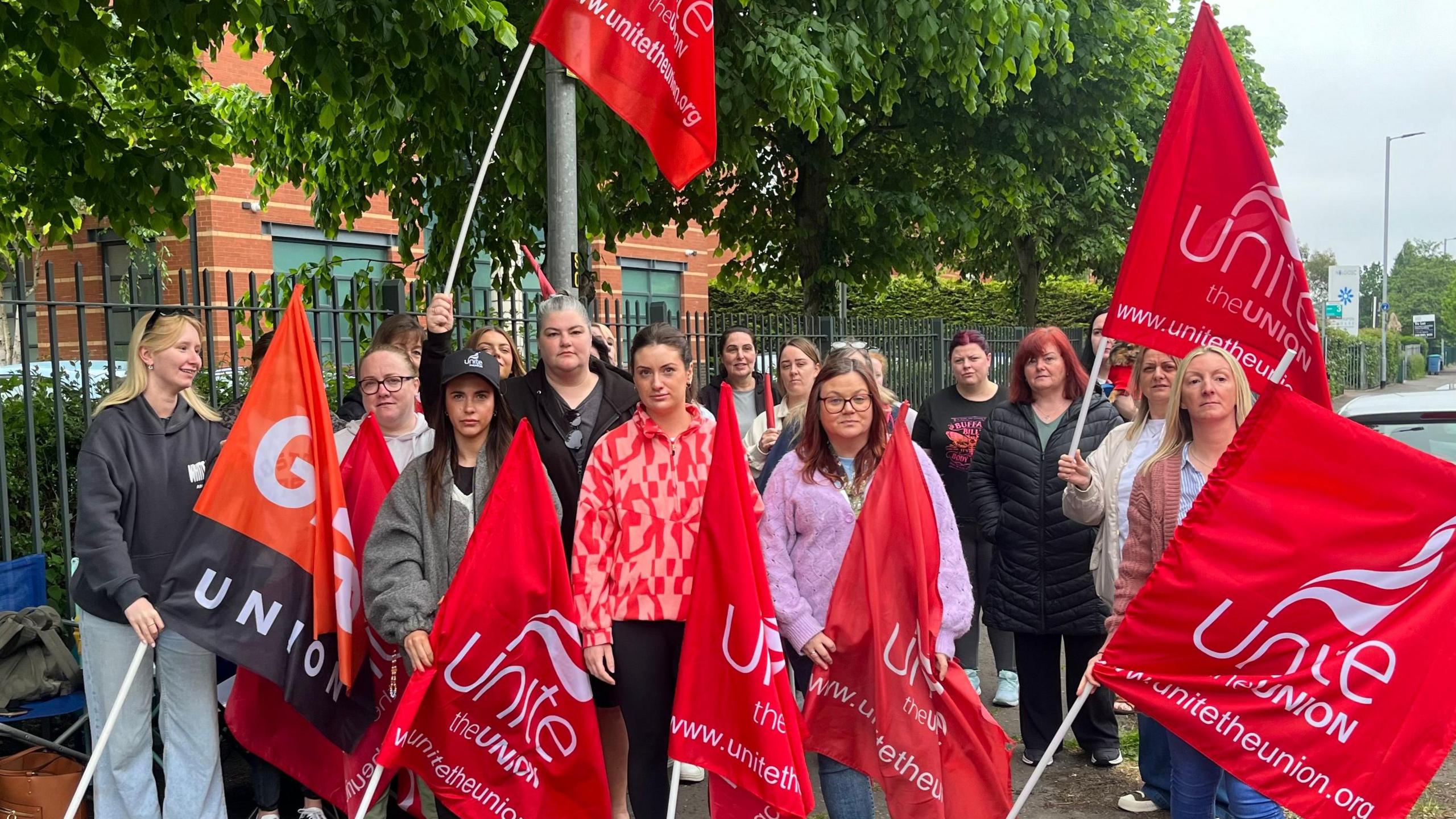
Special needs school workers walked out on Monday
Mr Curran added his pupils are "very often the forgotten children in society" as he called for government action.
"What we need to be doing is shouting from the rooftops to get them the right support.
"It is a disgrace that special schools are having to close today and everybody should be working together across the executive to find that funding to ensure that this is stopped as urgently as possible."
BBC News NI's Lyndsey Telford, reporting from Belfast:
The suggestion from the EA that parents and volunteers could potentially step in for striking staff was met with anger on the picket line.
Geraldine Kelly, a special educational needs classroom assistant at Fleming Fulton School, which neighbours Harberton in south Belfast, said the suggestion made her "angry" and that it made her feel like her skillset was undervalued.
"It's just proving even more how little we're thought of. The people who come in here day in, day out to look after children do an absolutely amazing job," she said.
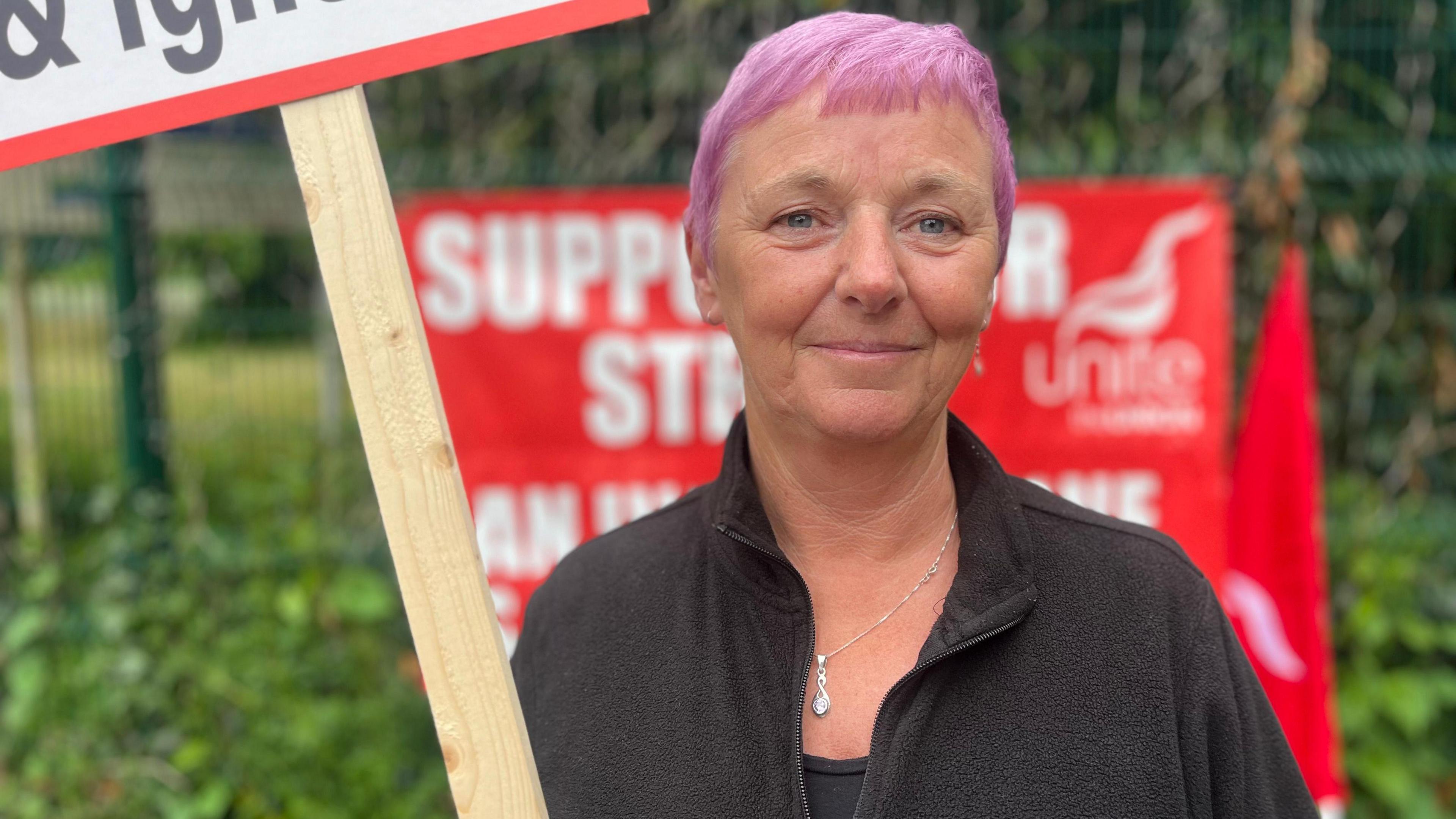
Geraldine Kelly says that classroom assistants felt like "an afterthought"
"The majority are women. A lot of the younger staff have second jobs because they can't live on the wages they're earning in here, and in most education jobs," Ms Kelly said.
"We get vetted to go and work, so where does that fit in? Do they vet these people before they come in and look after the children? Have they any experience looking after children with special needs? I don't understand why they would even suggest that."
She added that classroom assistants felt like "an afterthought".
"We just feel like we've been left behind, and that they don't consider us the way they consider teachers, which they should, because these schools would not run without us."
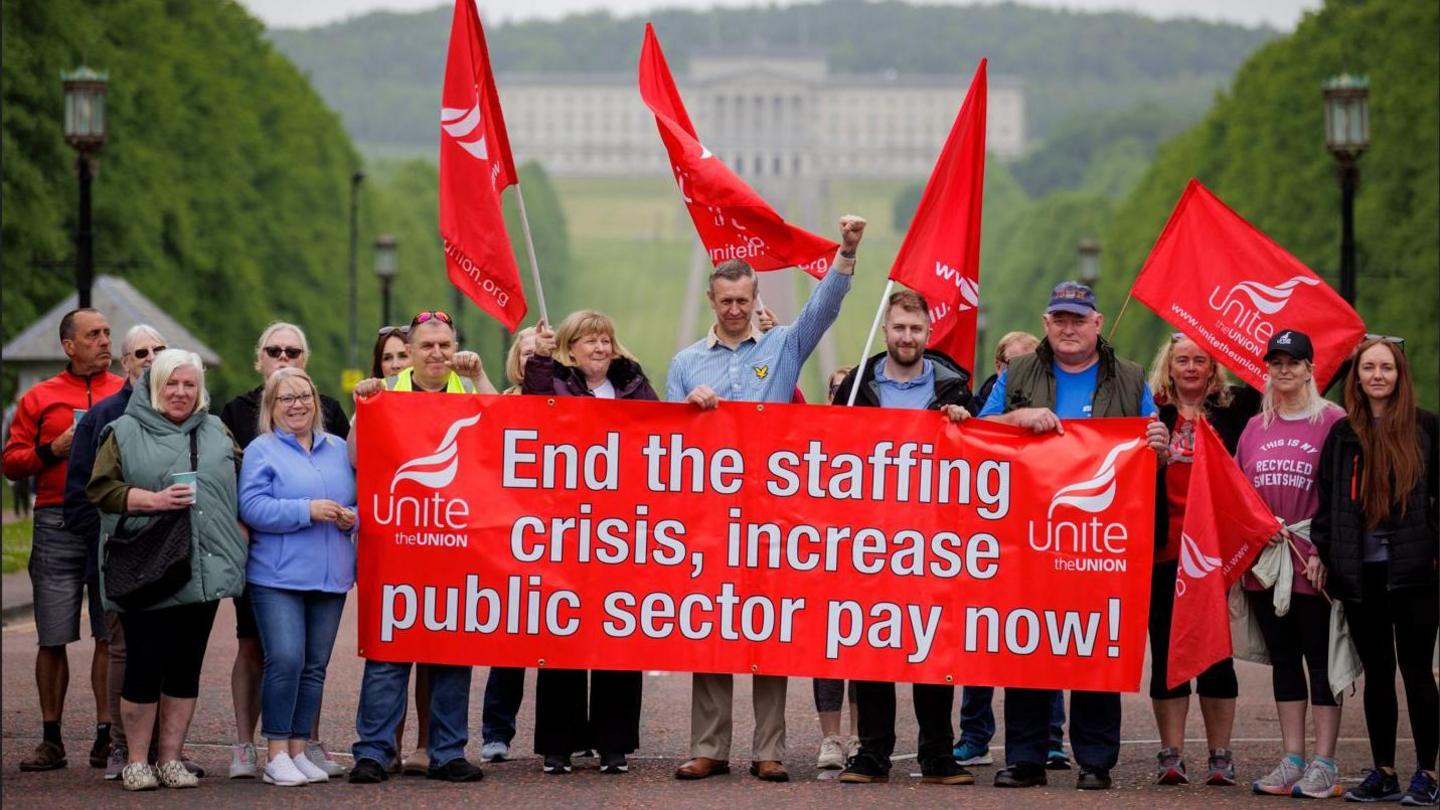
Non teaching staff took their protest to Stormont
A crowd of classroom assistants from Mitchell House, a special school in east Belfast, were among the striking workers.
Erin Ballantine is a special educational needs classroom assistant.
The 26-year-old said she loved her job but was considering giving up the role because she was struggling to make ends meet.
Her colleague Zoe McGrath said recruiting staff was a big problem due to low pay, and that workers were more stretched than ever.
She said she was worried about the effect "worn out workers" was having on the vulnerable children they look after.
At Stormont, school bus drivers with the EA, and a representative for Unite the Union, said drivers had the "huge responsibility" of safely transporting people's children, yet were paid "peanuts".
Thomas McMichael said it was frequently the case that some school bus services simply couldn't run due to a shortage of drivers, because of the pressures on staff retention and recruitment.
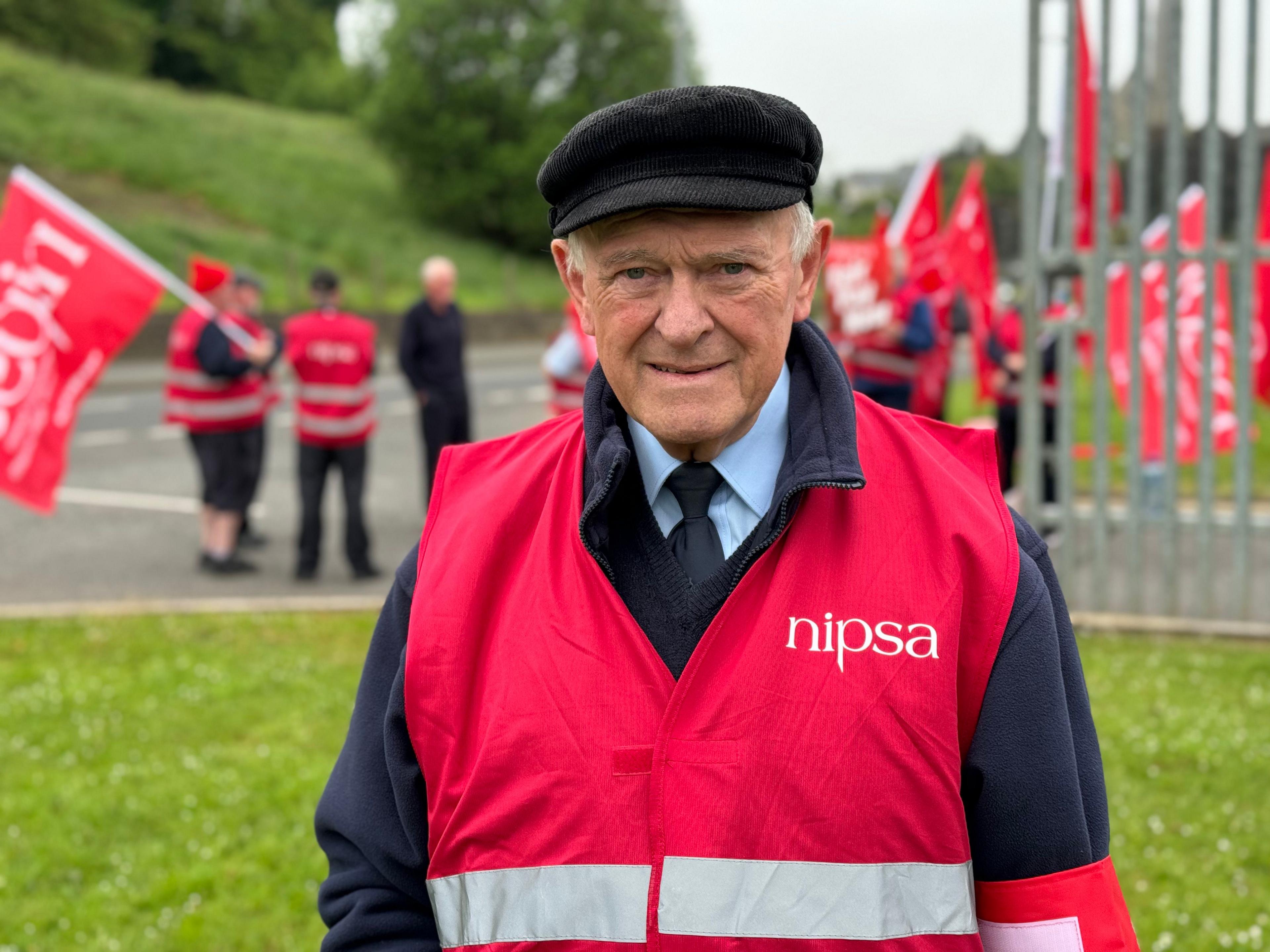
Robert Abernethy says bus drivers "had to take this stand"
BBC News NI's mid-Ulster reporter Niall McCracken, in Dungannon:
Robert Abernethy has been a bus driver for 27 years. He is on the picket line at the transport depot on the Killymeal road in Dungannon.
He said: “We’re striking against the promise that we were suppose to have regrading from 2019 and all the politicians were in favour that we should get this.
“But now they say there’s no money and funds have run out, so we’re protesting until we get are fair grading and fair pay.
“Drivers here are on just slightly about minimum wage and certainly for young people with families it’s very hard, it’s not a living wage anymore. So we’ve had to take this stand today.
“We’ve been here since 7am and we’ve had a lot of beeps and support already from the public, I think the public have a lot of sympathy for our position.
“Even I’ve found that parents have been very understanding, a few of them said to me ‘fair play take your stand’.”
How will the strike affect schools?
The Education Authority (EA) said the strike action would "cause significant disruption".
It said about eight schools were expected to close and five to partially close, would result in about 250 EA (yellow) buses not running and would impact on about 20% of children entitled to a free school meal.
Many schools across Northern Ireland will be affected, especially those who rely on EA buses to get pupils to and from school.
However, some special schools will be hit the hardest and some may have to close to pupils on strike days.
That is because special schools rely particularly on staff like classroom assistants to provide support to pupils and on transport provided by the EA.
What are the rates of pay?
School support staff are among the lowest paid in the education system.
Some jobs for classroom assistants are currently advertised by the EA at about £12 per hour.
Jobs for school bus drivers and catering staff are available at roughly the same hourly rate.
The pay and grading review would lead to improved pay scales and wages.
Why has the dispute not been resolved?
The dispute over the pay and grading review has been running for a number of years and has led to a number of previous walkouts.
But it now comes down to the 2024/25 Stormont budget.
In a letter to schools about the strike the Department of Education (DE) permanent secretary Dr Mark Browne said it would "have a significant detrimental impact on our children and young people, particularly the most vulnerable children with special educational needs".
Dr Browne said that to implement the review and award back pay from April 2022 would cost DE around £180m and then £90m a year going forward.
"When the executive met to set the budget, given numerous other competing pressures they did not have the funding required to implement these changes," his letter said.
"Consequently, it was agreed that the minister of finance should seek approval from the Treasury to bring forward funding set aside under the agreed funding package for future years to allow for additional funding to be accessed in 2024-25.
"The minister of finance is currently making that case and we await a decision from London."
Related topics
- Published19 May 2024

- Published14 May 2024

- Published16 November 2023
